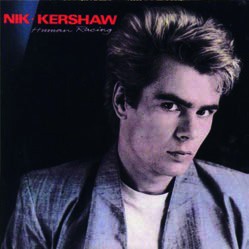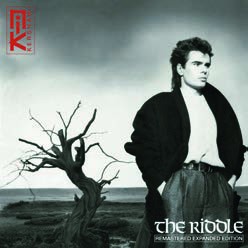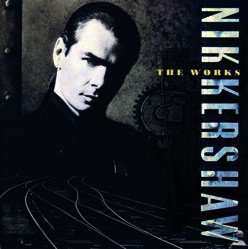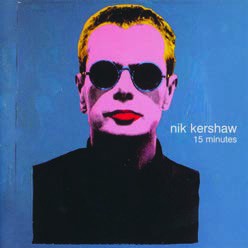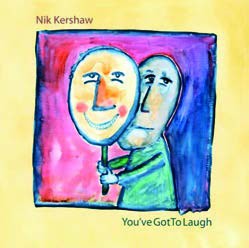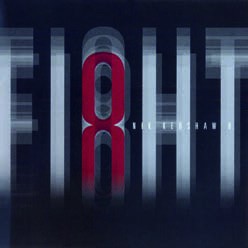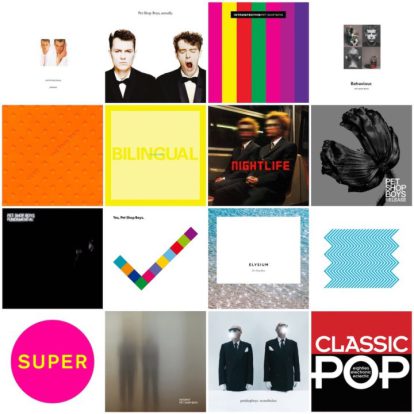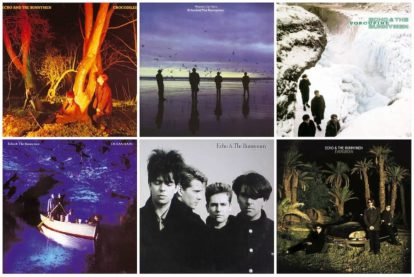Schooled in jazz fusion, Nik Kershaw became a teen idol before temporarily turning his back on the pop game and penning hits for others. Let’s take an in-depth look at the diverse back catalogue of this most inventive of singer-songwriters.

HUMAN RACING
Released: 1984
Label: MCA
Producer: Peter Collins
The son of a flautist and opera singer, Nik Kershaw’s cultured musicality is clear for all to enjoy on a debut album that became a straight-out-of-the box platinum-selling success.
While his boy-next-door good looks soon saw him marketed as a teen idol, this was a fledgling artist with serious musical chops; his previous band Fusion merged jazz, funk and rock in their setlists, covering among others Steely Dan and Weather Report. Not then, your typical young singer-songwriter taking their first baby steps in the pop world.
After Fusion split in 1982, multi-instrumentalist Kershaw spent the next year assembling Portastudio demos in an attempt to win a record contract. MCA subsequently snapped him up before Kershaw hooked up with producer Peter Collins for a 10-week period at Sarm East in East London over the summer of 1983. Re-recording the 15 or so demos he’d amassed over the previous 12 months, virtually everything was either used on the album or as B-sides for Human Racing’s attendant singles. Kershaw already had a clear vision for his debut album, a crowd-pleasing showcase for the diversity of his songwriting.
Lead-off single I Won’t Let The Sun Go Down On Me was deemed a reasonable success when it hovered into view at No.47 in the UK charts but Kershaw’s major breakthrough came with Wouldn’t It Be Good, a No.4 smash. I Won’t Let The Sun Go Down On Me was subsequently re-released and rose to No.2 at the second time of asking.
Nik soon became a chart star who was equally acclaimed by the old guard. Jimmy Page and Eric Clapton were fans; Elton John even went so far as calling him “one of the best songwriters of a generation.”
Kershaw’s debut is packed full of detail and nuance, from the seven-note melodic motif that follows the title in pulsing synth-pop opener Dancing Girls to the dazzling Brazilian percussive flourishes that drive Drum Talk (apparently thanks to bashing various bits of kitchenware in the studio).
In Wouldn’t It Be Good, Nik wrote one of the most indelible pop rock anthems of the decade. Meanwhile, the more introspective Bogart would be a signpost to the way ahead. Kershaw’s quirky multi-layered backing vocals are also a notable feature throughout, from the frantic jazz funk undercurrent of Gone To Pieces to the freewheeling and equally snappy Shame On You. On the dramatic Faces, his vocals recall Stevie Wonder and the latter’s soulful jazziness also inform the closing title track, a delicate ballad.
Sade’s Diamond Life stood in the way of Human Racing picking up the Best Album award at the following year’s BRITs, but this was a remarkable first step nevertheless.
THE RIDDLE
Released: 1984
Label: MCA
Producer: Peter Collins
Rushed to market to capitalise on the white-hot momentum of his debut, Kershaw had just two weeks to write and record the demos for Human Racing’s follow-up.
While The Riddle has its flaws, it’s a tribute to the songwriter that he managed to get this over the line at all. The fact that album two is amongst the most consistent of his career is even more noteworthy.
The success of Human Racing had spread across the Atlantic, too, with its jazz-pop-prog stew turning the heads of Miles Davis and Herbie Hancock. In fact, Davis even recorded a cover of Kershaw’s Wild Horses here which has yet to see the light of day. However, Nik’s jazzy background remained at odds with the marketing department’s teen heart-throb vision of him at MCA – Smash Hits called him “the thinking man’s Limahl” and that’s Kershaw looking all moody at Chesil Beach in Dorset on the cover, a cut-price The Joshua Tree if you like.
Helping out in the studio, keyboardist Paul ‘Wix’ Wickens – who went on to work extensively as a touring band member with Paul McCartney – features prominently on The Riddle as well as Elton John’s drummer Charlie Morgan and former Secret Affair bass player Dennis Smith. After helming Human Racing, producer Peter Collins was back on board for its successor, also recorded at Trevor Horn’s Sarm Studios.
Dominated by its three head-turning singles, the album kicks off with the bubbling synth cauldron of Don Quixote, its busy backing track reminiscent of Frankie’s Welcome To The Pleasuredome. Rather than courting his pop audience, Kershaw continually reaches back to his jazz fusion roots throughout the LP, from the popping bassline of Know How to the album highlight Easy featuring Mark King. Overdriven electric guitars power the rocking You Might and there’s an adult pop delicacy to the aforementioned ballad, Wild Horses. The oblique lyrics of The Riddle – much debated on Saturday morning kids TV, if your writer recalls correctly – reasserted Kershaw’s reputation as a square peg in a round pop hole; he was turning out multi-layered tunes that kicked against chart conventions.
The anti-Hollywood satire City Of Angels (“Hang loose at the Oscar show, And at the yacht club, too/ Don’t mess with me, ’Cos I’ve a bigger house than you”) and tongue-in-cheek single Wide Boy suggested Kershaw was already raising an eyebrow at the fickleness and vacuity of fame while the well-intentioned epic ecological anthem, Save The Whale, ends the LP on a reflective note.
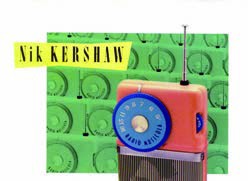
RADIO MUSICOLA
Released: 1986
Label: MCA
Producer: Nik Kershaw
After the frantic scramble to get The Riddle LP ready for release, its follow-up was a much more considered affair. In fact, Kershaw rather lost momentum as a chart act in the two years it took to put Radio Musicola together, not that he was overly bothered, of course; Nik was never particularly comfortable with the celebrity status forced upon him thanks to the success of Human Racing.
His discomfort is quite tangible here – the title track, boasting beefy Phil Collins-style cavernous drums, is a robust critique of the pop music industry conveyor belt (“Black vinyl man with black plasticised imagination/ More fodder for the new lost generation”), a clear treatise that integrity outweighs commerciality (“Why can’t you let us do it like Joni does it?”). It’s a dazzlingly sophisticated production – radio announcer vocal samples are liberally spliced throughout its intro, state-of-the-art back then and still eye-poppingly complex. This was an album where Kershaw really did sweat the small stuff, and pored over every minute sonic detail.
Elsewhere, on Nobody Knows, Nik rails against the tabloids in a pointed attack on press intrusion that’s as pertinent today as it was 34 years ago. He covers similar lyrical territory on the equally feisty What The Papers Say (“You know it’s true/ They’re the pillars of society and would they lie to you?). Yet amid the vitriol there’s also space for the reflective L.A.B.A.T.Y.D, which seemingly ponders on the existence of the afterlife and the delicate lighter-waving ballad Life Goes On.
Those jazz-funk roots return to the forefront of Kershaw’s sound once again on the ambitious Don’t Let Me Out Of My Cage, complete with cooing backing vocals courtesy of Nik’s then-wife Sheri. The proggish multi-part arrangement and discordant guitar solo of When A Heart Beats (now included on CD versions) also impresses and saw Kershaw make his final appearance in the Top 40 of the UK Singles Chart. Even more ambitious is the epic six-minute closing ballad Violet To Blue featuring the London Community Gospel Choir. The artiness of the album coincided with a dip in Kershaw’s commercial fortunes. But set against an LP that placed artistic integrity over mainstream success, it’s likely he felt that was a price worth paying.
THE WORKS
Released: 1989
Label: MCA
Producers: Nik Kershaw, Peter Wolf, Julian Mendelsohn
On face value, Kershaw’s decision to work with producer Peter Wolf on fourth studio album The Works seemed like a wise choice, a canny amalgam of experimentalism allied to a commercial instinct. After all, the producer had previously collaborated extensively with jazz rock legend Frank Zappa while also delivering pop-rock hits for Starship, Kenny Loggins, The Commodores and Wang Chung. However, after four months recording in Los Angeles, Kershaw returned to Blighty horrified by the results.
After writing two new songs including One Step Ahead, Nik made the radical decision of re-recording the whole album all over again with Julian Mendelsohn, fresh from hit collaborations with Pet Shop Boys and Level 42.
Chastened by the experience, Kershaw explained about the original LA sessions with Wolf: “Americans want predictable songs and sounds, whereas I chose the opposite. We have been fighting like cats and dogs in that studio, we were constantly clashing. In the end we decided to make a compromise, but with the result that neither of us was happy with the final [version]. It was all very annoying, but I also learned from it.”
The initial sessions boasted the cream of the LA session musician scene including drummers Vinnie Colaiuta and Jeff Porcaro, the legendary Jerry Hey provides horn arrangements while Michael McDonald and Siedah Garrett feature on backing vocals.
Despite including some precision-tooled pop rock – opener One Step Ahead and the beautiful reggae bounce of slowie Elisabeth’s Eyes should have been hits – The Works failed to chart in the UK and marked the end of Kershaw’s MCA tenure.
You can hear the influence of Stevie Wonder once more in the funky backing track of Take My Place while Bad-era Michael Jackson filters into the dazzling session muso masterclass of Don’t Ask Me. The brazen attempt to write an anthem on One World, though, feels a little leaden, yet the synthetic Middle-Eastern vibes of Burning At Both Ends featuring Siedah Garrett makes for an LP highlight.
15 MINUTES
Released: 1999
Label: Rhino/Eagle
Producer: Nik Kershaw
As the dying embers of Britpop burnt out, after spending the best part of a decade collaborating with Elton John and Tony Banks among others and penning songs for Chesney Hawkes and Let Loose, Kershaw returned with a strong collection of de rigueur acoustic and electric guitar-centric singersongwriter tunes. The stylistic impact of the major chart hitters of the period can be heard on the 12 songs featured here including the guitar plus programmed sonic background flourishes of Alanis Morissette and the anthemicism of Oasis.
In keeping with Britpop’s scorched earth classicism policy, synths are almost entirely excised in favour of multi-layered guitars. Chugging opener Somebody Loves You builds nicely to a fine chorus and wah-wah solo. Also impressive is the open-hearted ballad full of well-worn experience, Have A Nice Life, which sounds unfussy yet refined.
Album standout Billy is one of Kershaw’s favourite self-penned songs as he explained: “That would be my finest lyric. Lyrics usually take me days or even weeks but this was one of those rare occasions when they just poured out and everything fell into place.” A reflective atmosphere infuses many of the songs, from the rueful What Do You Think Of It So Far (“Five days a week for a slice of pie/ Six pack of beer for an anaesthetic”) to the equally thoughtful Fiction that features a rare synth wash as Kershaw looks back at the relentless passage of time. Only the six-minute Made In Heaven feels bloated; aiming for epic, its lack of melodic variety sees it outstay its welcome.
As was almost compulsory for every guitar-welding 90s musician, there’s a song called Shine On included in the tracklisting. Much better, though, is the title track, a wry musing on the fleeting nature of fame that includes a nod to Oasis (“Throw me money I’ll live forever”) and how there’s always some young pup snapping away at your heels (“Don’t go hesitating/ ‘Cos someone else is waiting for his 15 minutes”) before resolving into a Beatlesque anthem and dissolving into crowd noise.
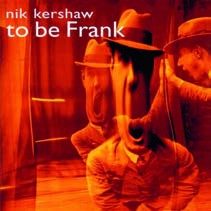
TO BE FRANK
Released: 2001
Label: Eagle/Koch
Producer: Nik Kershaw
It’s a shame if To Be Frank is the Nik Kershaw album that gets lost behind the back of the sofa – it’s not currently on Spotify and failed to chart at the time. Dig in to this mostly acoustic affair, though, and there’s plenty to enjoy. The perky tongue-incheek single Wounded deserved much better than its No.100 placing in the UK – it very knowingly almost breaks into La Bamba on several occasions (“We’re radio rental, accidental, too”); Kershaw later shrugged on his website: “[I recorded] three different versions of Wounded before I got it right and two videos for it. Nobody shows either of them.”
Nik’s vocals recall Stereophonics’ Kelly Jones on the album, maybe it’s just the acoustic-rock-meetsbeats of a noughties production, but Jones also comes to mind on the punchy Hello World.
Indie rocker Get Up is a self-help manual set to music, an ode to shaking off depression and seizing the day (“Life is bittersweet and it’s all going on without you.”).
Meanwhile, the pithy, well-observed character song Die Laughing is among the highlights and How Sad gets the full strings treatment (laid down back in his old Sarm Studios stomping ground from his first two studio albums). Already even includes a lightning-fast sample of Public Enemy’s Bring The Noise to add to the sonic stew. Certainly an album that’s ripe for reappraisal.
YOU’VE GOT TO LAUGH
Released: 2006
Label: Shorthouse Records
Producer: Nik Kershaw
Compiled over the course of five years, Kershaw’s first self-released album may not have seen the light of day at all if it wasn’t for his girlfriend (and now wife) Sarah egging him on. In a 2008 interview Nik explained: “The songs are all about my own experiences, or those of people around me. They’re about friends and foes, about real life, which means there’s nothing too glamorous going on.”
“I had a six-year hiatus and got myself a bit lost with aimless doodlings and unfinished songs,” he adds on his website.
Nothing too glamorous perhaps but You’ve Got To Laugh boasts bags of melodic ideas and feels far from aimless.
And talking of ‘foes’ there’s some real fire in the belly of album standout Loud, Confident & Wrong, written back in 2002 to give the middle finger to President George Bush. A rare dip into outright protest music territory, Kershaw’s anger at US foreign policy is palpable on lines like: “To leave us in the shitehouse, God thought he’d have some fun/ So he put him in the White House and said ‘give this man a gun’”.
That the anger is leavened with humour is a feature of Kershaw’s latter-day songwriting. Opener Can’t Get Arrested is a rueful shrug seemingly at how his career as a bona fide pop star is now but a distant memory – he’s (almost) happy to laugh at his own expense and the downright ridiculousness of it all.
His songwriting chops, whether chart-conquering or not, remain in place for the wellobserved Oh, You Beautiful Thing, a break-up ballad at a slight remove where Kershaw is providing a shoulder to cry on. Lost is equally well sketched and traces the fine line between domestic bliss (“Growing old, fat, gaseous and rich”) but without any real direction (“Sitting alone in the safety zone, No sweat and no excitation/ In your five-star fortification, Are you locking them out or locking you in?”). Meanwhile, there’s an intriguing claustrophobia to the tense Old House. Added to the Bush-baiting, Nik sounds equally fired up on the vitriolic I Hope You’re Happy Now, a Dylanesque kiss off (“I’m not one to anger quick, You condescending little prick.”) He’s in the autumn of his songwriting years, but clearly Kershaw is still raging against the dying of the light.
EI8HT
Released: 2012
Label: Shorthouse Records
Producer: Nik Kershaw
A sense of hard-won wisdom permeates the lyrics of Kershaw’s final album to date – and the songwriter is in reflective mode during several key moments.
You can hear him passing down advice to the next generation on The Sky’s The Limit, an anthem of hope and positivity. Its string-laden coda also underlines what a classy piece of tunesmithery this is. Equally anthemic is the philosophical Enjoy The Ride, delivered once more from the position of a life well lived.
If introspection is at the nub of Ei8ht, it’s matched with some of the most refined melodies of Kershaw’s career. It’s a selection box of AOR styles that takes in folk, pop and rock with a dash of his trademark jazziness, though not to the same extent as his peak fusion years.
Lyrically, Kershaw found himself in a quandary as he explained at the time of the album’s release: “[I’m] happy, settled and content. What the fuck am I going to write about? Slowly it comes. Loved ones, friends, family, growing old, childhood memories…”
It’s the universalities of all of our lives then. Ei8ht is big on generalities, less so on specifics. Cultured break-up ballad Runaway, which includes the wry lyrical aside “If you leave me, can I come, too?” is the kind of widescreen pop that would have been a massive hit in the hands of Take That, Boyzone and Westlife in all their later years. You’re The Best is one of the most straightforward love songs in Kershaw’s back catalogue and Red Strand another slick MOR ballad that comes with a little Celtic flavour attached.
More intriguing is the jaunty almost music theatre vibe of the prosaicallytitled Stuff that you can imagine Small Faces frontman and one-time child star Steve Marriott doing a fine job on. On Rock Of
Ages, Nik even dips into unvarnished 70s classic rock with a nod to Peter Frampton and The Bell leaves us once more pondering on the passage of time, a parent wistfully recalling his child and “high hopes in a high chair”.
LIVE & ACOUSTIC
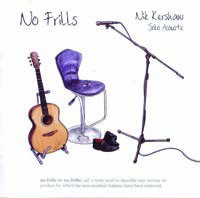
NO FRILLS
Released: 2010
As is often the way with these type of solo acoustic reboot albums, it’s the radical transformations that are the most satisfying. How about a baroque refit of Dancing Girls or a beatbox shuffle for Don Quixote? Kershaw’s complex arrangements were always his calling card, and this LP puts them under the microscope to fine effect. Case in point, some deft fingerpicking gives the melody of Wouldn’t It Be Good room to breathe. It’s up close and personal as Kershaw explained: “All flaws, squeaks, rattles, and buzzes recorded in glorious 24-bit stereo. Small children, local wildlife and Stansted Airport trying to make guest appearances.”
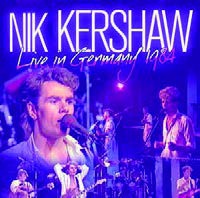
LIVE IN GERMANY 1984
Released: 2011
Squeezing all of the juice out of Human Racing including B-sides Dark Glasses and Monkey Business, Nik’s slick backing band don’t stray too far from the original studio incarnations for this 12-song live set. If the reaction of the screaming fans is anything to go by, that was just fine by them. All concerned dazzle, though, on the percussive masterclass of Drum Talk and Kershaw sings a brief snippet of As Time Goes By from Casablanca to set up Bogart. Meanwhile, I Won’t Let The Sun Go Down On Me sounds iconic right from the get-go.
Classic Pop may earn commission from the links on this page, but we only feature products we think you will enjoy.

